Report by Kamgar Ekta Committee (KEC) correspondent
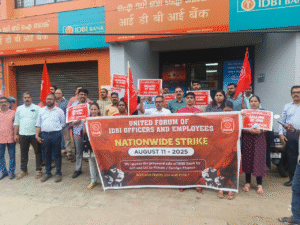
On 10 August 2025, on the eve of IDBI workers’ nationwide strike, the All India Forum Against Privatisation (AIFAP) organized a successful online meeting in support of the strike, titled “Oppose the sale of IDBI Bank to Indian and foreign monopolies.” Nearly 300 workers from banks, insurance, railways, electricity and other sectors attended the meeting.
Leaders of bank and insurance workers spoke at the meeting: Shri Devidas Tuljapurkar (Convenor, United Forum of IDBI Officers and Employees, and Joint Secretary, All India Bank Employees Association), Shri Vithal Koteswara Rao A.V. (Joint Convenor, United Forum of IDBI Officers and Employees, and General Secretary, All India IDBI Officers Association), Shri Nagarajan (National Leader, All India Bank Officers’ Association), Shri Hari Rao (National Leader, Bank Employees Federation of India), Shri Thomas Franco (Joint Convenor, People’s Commission for Public Sector and Public Services), and Smt. Geeta Shant (Central Working Committee Member, All India Insurance Employees Association). The meeting was conducted by Dr. A Mathew, Convenor of AIFAP and Secretary of Kamgar Ekta Committee (KEC). Several participants also expressed their views after the main speeches. Here, we present some highlights from the speeches.
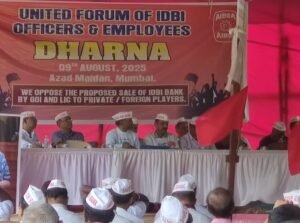
Dr. Mathew (AIFAP and KEC) said in his opening address that ever since the policy of privatization, liberalization and globalization was launched in 1991, various governments at the centre have pushed for opening up the banking and insurance sector as well as other sectors to private capital—both domestic and foreign. This was further speeded up after the NDA-led government came to power in 2014 and said “The Government has no business to be in business.” They want to hand over electricity, railways, education, health, banks, insurance, etc. to private monopolies. Dr. Mathew said, we must ask: Should supplying electricity be a business? Is giving healthcare to our people a business? He informed everyone of the valiant struggle of Uttar Pradesh electricity workers and engineers against the privatisation of state discoms. To support the struggle, which has completed more than 250 days, AIFAP had organized an online meeting on 2nd February 2025. He also informed everyone about the recent moves of the Railway Board to introduce contract workers in safety categories of the Indian Railways, a hazardous step for both workers and passengers that must be unitedly opposed. AIFAP had organised an online meeting against this move on 20th July 2025.
Dr. Mathew provided a brief background on the formation of IDBI. While IDBI was formed in 1984 for development financing, the government converted it into a purely commercial bank in 2004. As IDBI accumulated bad debt worth thousands of crores, the government forced LIC to acquire 51% of IDBI. After this, the RBI recategorised IDBI as a private sector lender! Evidently, the RBI and government were deviously setting the stage for the sale of IDBI. After takeover by LIC, the finances and operating profits of IDBI have improved significantly. It is now that the government has decided to sell off 61% of the government and LIC’s combined shares to a private monopoly corporate. He called upon everyone to support the strike of IDBI officers and employees.
Shri Devidas Tuljapurkar (UFIOE, AIBEA) emphasized that the privatisation of IDBI cannot be seen in isolation. It is part of a trend: earlier, Lakshmi Vilas Bank was bought by Singapore-based DBS group; now, the Japanese Sumitomo Mitsui Banking Corp (SMBC) group is trying to buy Yes Bank and Dubai’s Emirates NBD group will be buying IDBI. He warned that recent free trade agreements signed by India clearly indicate that international finance capital will try to acquire Indian finance capital, threatening our country’s sovereignty in banking and finance.
He said that whenever a private sector bank is about to collapse, it is merged with public sector banks, citing examples of United Western Bank, Global Trust Bank, and Yes Bank. However, IDBI is being sold off although it is profitable. The moment IDBI comes out of ownership of government of India and LIC, the guaranteed coverage amount will come down drastically to Rs. 5 lakhs. That is, out of common man’s deposits, only Rs. 5 lakhs will remain safe. Moreover, IDBI has given lakhs of crores of write-offs and haircuts to big corporates. We should demand CAG audits for all such settlements. The big corporates are eyeing the 29 properties of IDBI in the country. In Hyderabad alone, IDBI has around 50 acres of property, which is worth more than Rs. 10,000 crore.
The United Forum of IDBI Officers and Employees (UFIOE) has told government authorities that until they agree to the demand that IDBI should remain in the public sector, the struggle will not be withdrawn. The issue of IDBI privatisation should be taken up by all bank unions, all trade unions, and all those concerned about economic independence and sovereignty.
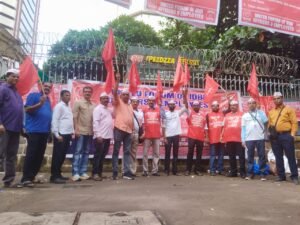
Shri Vithal Koteswara Rao (UFIOE, AIIDBIOA) thanked AIFAP for consistently fighting against privatisation and emphasized that privatisation is against nation-building. He briefly explained the history of IDBI and its pioneering role in catalyzing broad-based development in India. Even institutions like SEBI, NSE, SIDBI, etc. were built with the support of IDBI.
If IDBI is privatised, the deposits of people will no longer be safe. The main purpose of a private bank is profit, not social banking. This is clear in the case of ICICI, a private bank that recently increased its minimum balance from Rs. 10,000 to 50,000. IDBI gives loans to small borrowers and farmers; however, foreign/domestic private players will not support this. As IDBI is under government and LIC ownership, it provides unsecured education loans up to 4 lakhs. This service will also no longer be available once IDBI is sold off.
Shri Koteswara Rao said that the hard-earned money of the general public is under threat. He urged the general public and bank customers to join the struggle and stop the privatisation of IDBI.
Shri Nagarajan (AIBOA) stated that the current steps of the government should not be regarded as a standalone attack on the financial system. There is every attempt to bail out corporates and kill public sector banks (PSBs). As per recent data, PSBs have bad loans worth 16 lakh crores, and recovery is negligible. It is the corporates that are benefitting from this. All India IDBI Officers’ Association and All India IDBI Employees’ Association have carried out a brilliant struggle against bad loans and for saving IDBI. This situation is a litmus test. If bank workers do not resist attacks now, this will allow the government to eventually reduce their stake in Bank of Maharashtra, Central Bank of India, Indian Overseas Bank, UCO, etc. SEBI has clearly directed the government to substantially reduce their holdings in banks either in one stroke or over 3 years.
RBI is actively considering the participation of foreign investors, which is currently capped at 20%. The Japanese SMBC group, however, wants a 26% stake in Yes Bank as well as voting rights. Notably, when a bank is handed over like this, all pension funds, mutual funds, PFs, etc. are also handed over. Such privatisation will inevitably lead to a repeat of the 2008 financial crisis. Combined with the pressure of USA on various accounts, this will reshape the Indian political landscape. Moreover, there are incessant attacks on jobs, such as in the case of recent TCS layoffs. Everywhere, public services are being privatised for profit. Our struggle should be broad-based and should involve customers.
Shri Rupam Roy (AIBOC) could not attend the meeting because of another meeting with the Indian Banks’ Association. He sent a message of solidarity for the AIFAP meeting and expressed that if IDBI unions take a strong stand to keep the bank within public control, the United Forum of Bank Unions will fully support IDBI staff and their agitations.
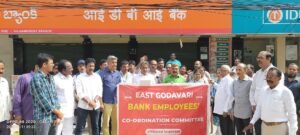
Shri Hari Rao (BEFI) said that the sale of IDBI will allow the government to hand over the country’s banking sector—and divert ordinary people’s deposits—into the hands of financial capitalists. Already, the SBI, which had been forced to buy 20% stake in Yes Bank in 2018, has quietly sold 13.19% of its stake to the Japanese giant SMBC. AIFAP’s online meeting is a step towards preparing ourselves for the struggle to come.
Among the main bidders for IDBI was Canada’s Fairfax Financial Holdings Ltd. Fairfax had made donations of crores of rupees to the ruling party through electoral bonds. Fairfax is not new to this game: in 2018, the company acquired 51% stake in Catholic Syrian Bank for approximately Rs. 1000 crore and renamed it as CSB Bank. After this, they shut down branches of the bank, dismissed 82 officers, reduced the retirement age to 58 years, imposed disciplinary actions on thousands, and cut down wages of temporary employees. Notably, CSB is the only bank that has not implemented the 11th and 12th bipartite settlement and wage agreement. In this bank, the minimum balance is Rs. 10,000, and the bank gives no agriculture, education, or vehicle loans. It only offers gold loans with high interest rates, steep processing fees, and immediate action if repayment is delayed. Moreover, Fairfax sold just 9.72% of its stake for nearly Rs. 600 crore, making huge profits over their initial investment.
IDBI, other public sector banks, and regional rural banks stand to face a similar fate if we do not oppose the proposed sale. Can a one-day strike stop this? We need to build unity not only in the entire banking sector but also among workers, farmers, and youth across the country. Today’s meeting will give fresh energy to the struggle.
Shri Thomas Franco (PCPSPS) said that the government is for, by and of the corporates and is determined to sell out the entire banking system. He informed that former chairman of SBI Rajnish Kumar has narrated in his book what happened when Yes Bank went into crisis. In a meeting at Antilia, where Kumar was invited and a representative of BlackRock was present, SBI was asked to give an officer to take over Yes Bank. Accordingly, Chief Finance Officer Prashant Kumar was asked to resign from State Bank of India and take an appointment in Yes Bank.
Today, the RBI allows foreign holdings in banks up to 74%. Already, banks such as ICICI, Axis Bank and HDFC Bank have foreign shareholding of more than 51%. If the government wanted to bring domestic or foreign private companies to “save” IDBI, this should have been done in 2019, when the bank had losses of around 49,000 crore. Instead, they asked LIC to step in, and LIC nurtured this bank very well. Today, the profit of the bank is around Rs. 7500 crore as of March 2025, and yet it is being sold off.
This is the beginning of privatisation of public sector banks. Customers will be badly affected and their deposits will no longer be safe. Shri Franco appealed to all comrades to join the long struggle ahead of us.
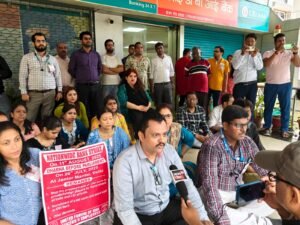
Smt. Geeta Shant (AIIEA) expressed solidarity with the strike, stating that this is a joint struggle of workers. She informed that AIIEA has given a call for demonstrations on 11 August, 2025. On 8 August, insurance employees conducted a badge wearing programme in support of the IDBI strike.
She said that to fight against the policy of privatisation, we need unity and a wider perspective. The government is snatching education, health, banking, transportation and all other public services and handing them over to a few big corporates. Often, workers see that the government does not heed to their demands despite their strikes, protests, and consistent agitations. However, victory is possible when we come out on the streets, as evident in the recent case of school closures in Uttar Pradesh. The UP government announced that 1000s of schools will be merged and 5000 schools will be closed. The UP High Court gave a decision in favor of the government. However, when people came out on the streets to save schools, the government was forced to withdraw some of their initial plans.
Ms. Shant stressed that our only option is to step out on the street. We should go to bank customers, we should print leaflets, and we should launch public campaigns. The people are with us. We should demand not only an end to privatisation but also the nationalization of education, health, banks, etc. We should place solutions and alternative economic policies before the public. Never in history have people who fought against their rulers lost. Our struggle should be transformed from an employees’ struggle into a people’s struggle.
Many participants expressed their views after the speeches. They highlighted that people have no decision-making power, whether it is about education, health, or about how their money should be saved and invested for public welfare. Participants emphasized the importance of bringing women and families in our struggles and going to the streets. The meeting ended on a spirited note, with all expressing their solidarity with the IDBI strike.
